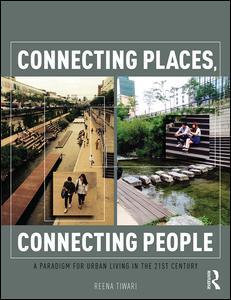Connecting Places, Connecting People A Paradigm for Urban Living in the 21st Century
Auteur : Tiwari Reena

What is a better community? How can we reconfigure places and transport networks to create environmentally friendly, economically sound, and socially just communities? How can we meet the challenges of growing pollution, depleting fossil fuels, rising gasoline prices, traffic congestion, traffic fatalities, increased prevalence of obesity, and lack of social inclusion?
The era of car-based planning has led to the disconnection of people and place in developed countries, and is rapidly doing so in the developing countries of the Global South. The unfolding mega-trend in technological innovation, while adding new patterns of future living and mobility in the cities, will question the relevance of face-to-face connections. What will be the ?glue? that holds communities together in the future?
To build better communities and to build better cities, we need to reconnect people and places. Connecting Places, Connecting People offers a new paradigm for place making by reordering urban planning principles from prioritizing movement of vehicles to focusing on places and the people who live in them. Numerous case studies, including many from developing countries in the Global South, illustrate how this can be realized or fallen short of in practical terms. Importantly, citizens need to be engaged in policy development, to connect with each other and with government agencies. To measure the connectivity attributes of places and the success of strategies to meet the needs, an Audit Tool is offered for a continual quantitative and qualitative evaluation.
Acknowledgments
Prologue
Foreword by Professor Peter Newman
Part I: The Concept
Chapter 1 Connecting Places, Connecting People
Chapter 2 Connecting Places for Better Communities
Part II: Mapping the Context: Urban Reconfigurations
Chapter 3 Reconfiguring Movement
Chapter 4 ‘Making’ Places: Urban & Suburban Transformations
Part III: Connecting Places, Connecting People: Making it Happen!
Chapter 5 Remodeling Approaches: Empowering Place Making and Connectivity
Chapter 6 Evaluating People, Place & Transport Connectivity
Part IV: The Future
Chapter 7 Emerging Challenges—Connected Places in the Global South
Chapter 8 Emerging Challenges—Technology Mega-trends & Demographic Shifts
Epilogue: Ethnography of Place and Movement
Index
Reena Tiwari is a professor of Built Environment at Curtin University, Australia. She has published extensively on space psychology and place making; urban ethnography and community engagement; sustainable transport and urbanism. Fundamental to her work on urban transport and place making is the philosophy of democratic urbanism and a model of enquiry that is ethnographic, collaborative and trans-disciplinary, and has the goal of facilitating change and adaptation for all involved in the process.
Date de parution : 02-2018
18.9x24.6 cm
Disponible chez l'éditeur (délai d'approvisionnement : 14 jours).
Prix indicatif 93,25 €
Ajouter au panierDate de parution : 09-2017
18.9x24.6 cm
Disponible chez l'éditeur (délai d'approvisionnement : 14 jours).
Prix indicatif 264,58 €
Ajouter au panierThème de Connecting Places, Connecting People :
Mots-clés :
BRT; mobility; NMT; accessibility; Connected Places; place-making; Active Transport; liveable communities; High Quality Public Realm; transportation planning; Clean Air Asia; Robert Cervero; Grassroots Urban Activism; Transit oriented development; Automobile Era; TOD; Dense; sustainable mobility; Face To Face; connectivity; Driverless Cars; Soft Policy Measures; Urban Reconfiguration; High Quality Place; Active Transport Infrastructure; NMT User; ICT Application; Formal Public Transport; Dense Urban Form; NMT; Bicycle Infrastructure; Mockingbird Station; Informal Public Transport; NE 98th Street; Pedestrian Realm



